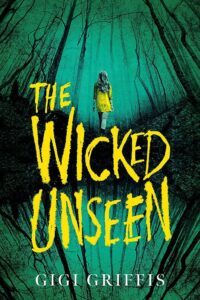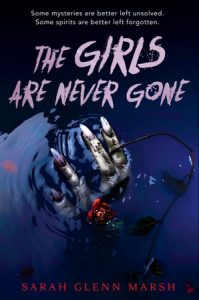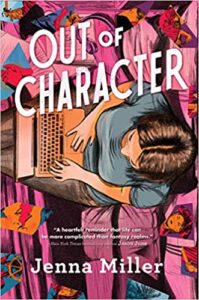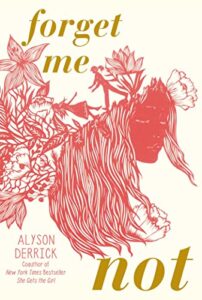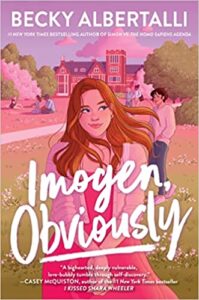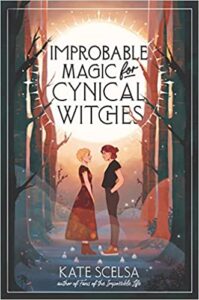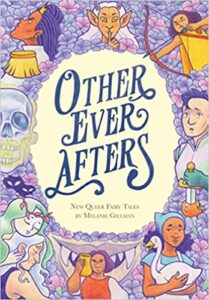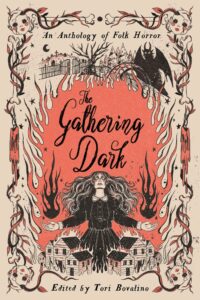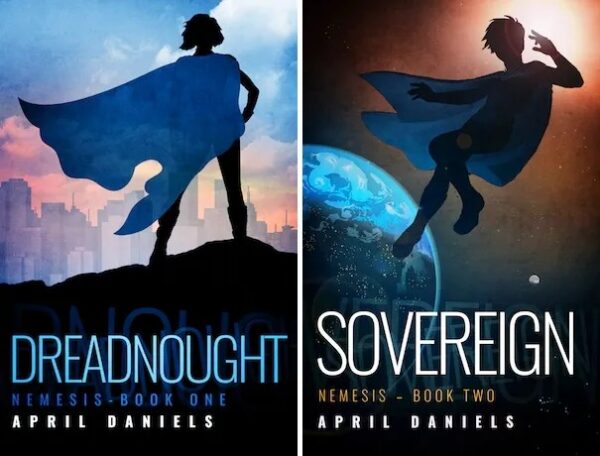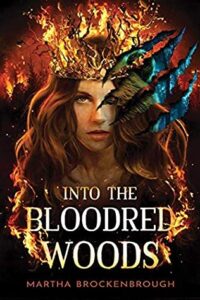Audre doesn’t fit well in the conservative small town to which she’s moved. She’s from New York City. She’s a lesbian. She’s a determined skeptic. And she’s the daughter of an occult researcher and a mortician. So when the preacher’s daughter, Elle, disappears, suspicion falls on Audre’s family. She works to find Elle, not only to rescue her crush, but to clear her father’s name.
For a quick read, this has a surprising depth of character. Audre is in some ways a typical heroine for a YA novel: loud, determined, most always right. But added characteristics like her affinity for horror movies make her feel more fleshed out. Similarly, her friend David is a typical sidekick character, made more developed thanks to his interest in journalism. Love interest and missing girl Elle features in flashbacks, making her not just a damsel in distress but a girl grappling with larger questions of faith and belonging.
The queer content is realistic. Audre is the new girl with a crush. Elle is a local who seems to reciprocate. It’s not magical instalove, which in my opinion makes for a more satisfying story. Amid a community that sees them as evil and aberrant, these two are just normal teenagers.
Overall, I enjoyed reading this. It balances the creepy, cultish small town with the just-this-side-of-too-much sweetness of Audre’s family. (Her parents dress as Gomez and Morticia Addams for Halloween and it’s almost too adorable!) Audre and David are actually pretty terrible investigators, but the fast pace and forays into Elle’s point of view keep the book from ever feeling dull. In some ways, I wish it had engaged with its more serious themes, but overall that’s just not what this is. It’s a quick YA mystery about a girl’s disappearance and the validity of a queer teen.
Trigger warnings: homophobia, religious trauma, racism
Tag Archives: YA
Sapphic YA Romance in a Haunted House: The Girls Are Never Gone by Sarah Glenn Marsh
Amazon Affiliate Link | Bookshop.org Affiliate Link
The Girls Are Never Gone by Sarah Glenn Marsh is a YA supernatural horror novel. Its protagonist, Dare, is just beginning her summer internship restoring an old house and recovering from a breakup with her boyfriend. She plans to use the summer to launch a podcast about the house’s history of mysterious drownings. While investigating, she teams up with Quinn, who is possibly haunted and definitely cute. The book shines in its interpersonal and representational qualities, but sadly falls short of the mark as a genre novel.
As far as character writing, this one excels. Dare is openly bisexual and diabetic. Her diabetes clearly impacts her life day to day, and is portrayed as a challenge but not an impediment. Her relationship with Quinn, meanwhile, is mostly cute and genuine, with the two sharing sweet moments. Occasionally, conflicts between them would feel stale and forced, but that plays more into plotting issues discussed later.
It’s not only the central romance that was sweet. Dare and Quinn intern alongside Holly. Although the girls don’t always agree, they develop a nice friendship. In her investigation, Dare meets an older woman who casually mentions a wife and child, adding to a sense of queer normativity. Most of the characters in the book are women: protagonists, antagonists, secondary characters. It offers the book a sort of cozy feminism. Women can indeed be heroes and love interests, but they can also just exist on the sidelines.
Unfortunately, as a genre read, this one fell flat for me. For one thing, there were way too many past characters. It might have worked better if I’d read it as a print novel instead of listening to the audiobook, maybe seen pictures or something similar to develop them. Instead, it was a litany of dead and missing girls without much context to any of them, and I had a difficult time keeping track of which one did what when.
Also, for a spooky story, it wasn’t that spooky. This is partly because Dare is a skeptic—which is a fine trait to have, until it leads to a character who spends two-thirds of the book oblivious to something readers know from the summary. To me, it felt like nothing was happening because the main character actively ignored the plot, making for a frustrating and sometimes plodding read. At times the story even seemed to cut away from the most dramatic moments. I’m not a big fan of romance as a primary genre, so this made for a less-than-stellar reading experience for me.
Trigger warnings: murder, supernatural
Lack-of-trigger warning: nothing bad happens to the dog 🙂
For Nerdy Queer Teens Past and Present: Out of Character by Jenna Miller
Amazon Affiliate Link | Bookshop.org Affiliate Link
Talk about a painfully relatable read. I’m almost glad this wasn’t around when I was a teen, because I’m not sure I could handle reading it then!
Cass is a fat, nerdy queer teenager who is obsessed with a book series and roleplays as one of the characters in an online community. I was a fat nerdy queer teen who was obsessed with a book series and roleplayed in an online community! She’s a chronic overthinker, I’m a chronic overthinker. Needless to say, I cared a lot about Cass and felt protective of her while reading.
Cass has escaped into the world of roleplaying to avoid her parents’ fighting. Then, at the very beginning of the book, her mom sits her down to have a conversation. She met someone online, and she’s moving to be with him and divorcing Cass’s dad. She immediately gets up and drives off to another state. I feel like I was more angry at her than Cass was.
Her mother was the most important person her life, the one who overdoes holidays and ropes her and her dad into a million traditions, the one who was there for her in all her lowest moments. She was a central pillar of Cass’s life—and she just drives off after a five minute conversation. I won’t spoil anything, but she hardly gets in touch with Cass at all after that.
Needless to say, Cass is devastated. So she spends even more time in her roleplay world. She stays up late, ignoring her homework and checking her phone constantly. She’s struggled with gaming addiction before, so she keeps this part of her life from her dad and her IRL friends, because she can’t stand the idea of this being taken away from her.
Some of her best friends are online, and they are a big source of support. One of them is Rowan, who plays the other half of her ship, and they’ve always been there for each other. (Psst, I also roleplayed a gay couple with my best friend as a teen… I told you this was relatable.)
Then, something unexpected happens. Taylor, the girl Cass has had a crush on for the longest time, asks her out. Suddenly, she has a girlfriend. It’s not perfect timing, because Cass is struggling, but she’s not about to turn down this opportunity—even if Cass feels a little awkward with her, especially because she’s hiding both her online life and her family struggles from her.
The chapters are interspersed with roleplay scenes, which might not work for everyone, but was very nostalgic for me, and they nicely complemented what was happening in Cass’s AFK world.
As I mentioned, I felt so protective of Cass. Her and her dad are doing their best to make a new normal at home, so Cass hides how much she’s struggling. Her grades begin to drop, she forgets to apply to universities, and it feels like no one is noticing that she’s in free fall. My heart broke for her, and I understood completely why she felt helpless to reach out, especially as each problem compounded, making her life feel like a house of cards.
It was also nice to read about a main character who is so confident both in being fat and being a lesbian, especially as a teenager. There still aren’t many examples of that in media.
Although obviously I have talked a lot about Cass here, none of the characters felt one note—not even the peripheral ones, like Cass’s best friend’s girlfriend. It would be easy to write Taylor’s character in a way that excuses Cass not totally clicking with her, but she seems great, and I felt for her.
The conflict all comes from people having different perspectives, which are each valid. Cass’s roleplay friends are hurt and angry that she’s hiding them from the people in her life, for instance, which is understandable—even as Cass isn’t ready to have anyone question this part of her life.
While there are a lot of elements to this story, including family as well as romance, it was the friendships that stood out to me, and how seriously they’re taken. They’re often messy and imperfect, but they’re also so important to Cass, and they can be unexpected and beautiful even when they’re messy.
I highly recommend this for nerdy queer teens and those who once were nerdy queer teens—though I’m sure lots of other readers would enjoy it, too.
Girl Meets Girl, Girls Fall In Love, Girl Gets Amnesia: Forget Me Not by Alyson Derrick
Amazon Affiliate Link | Bookshop.org Affiliate Link
Last year, I reviewed She Gets the Girl written by Alyson Derrick and her wife, Rachael Lippincott, and really enjoyed it. So when I saw that Derrick had a new sapphic YA book coming out just in time for the April 4th episode of All the Books, I had to read it. This is an amnesia romance, but while that can sound like a soap opera premise—girl meets girl, girls fall in love, girl gets amnesia and forgets girl, girl tries to win her back—there’s an undercurrent of sadness here that keeps it feeling more grounded than that suggests.
In the first chapter, we meet Stevie. She just graduated high school and has big plans for what comes next… but almost no one in her life knows about them. She has secretly been dating Nora for years, but in their small conservative town, being out isn’t an option. Stevie’s mother is deeply involved in the Catholic church, and her father watches Fox News almost every waking hour. So Nora and Stevie see each other in private, with dates in the woods. When Stevie can’t sleep, she silently calls Nora and just listens to her voice, not wanting to wake up her parents in the next room by speaking herself.
It’s been difficult keeping this private, including having to fake a better relationship with her parents than she believes and even maintaining friendships with people she no longer gets along with, but it will be worth it. They just need to get through the summer before they’re both off to California–Stevie secretly applied to UCLA and got in—and then they can start their life together. They’ve been saving up for an apartment by saving their paychecks, plus Stevie’s job at a coffee shop two towns away is the perfect cover for the time she spends with Nora.
After all that meticulous planning, though, one moment erases everything they’ve worked for. During a date in the woods, Stevie falls. She’s put into a medically induced coma. When she wakes up, she’s forgotten the last two years. She still thinks she’s 15. And she doesn’t remember ever meeting Nora.
Stevie is left trying to piece together the time she’s lost. She’s distant with her parents, and she doesn’t know why. She can’t understand why she was alone in the woods when Nora saw her and rescued her. Any evidence of her relationship with Nora was deleted or hidden, so there’s nothing to stumble on.
Interspersed with these chapters are unsent letters from Nora, explaining her heartbreak and confusion. This version of Stevie doesn’t have any idea that she’s gay, never mind that she’s in a relationship with a girl. She’s worried that telling her will scare her off, but she also feels terrible about lying to her. Stevie thinks Nora is a new friend, someone to hang out with that doesn’t have memories of her that she doesn’t have. Both of them hope that Stevie can recover her memories by retracing familiar things, but there’s no guarantee.
There’s an interesting balance happening here between Nora and Stevie’s perfect relationship (pre-coma) and their hateful surroundings. Stevie is half Korean, and she is startled to find her best friends when she was 15 have grown up to make racist jokes. Her dad has also become obsessed with Fox News in recent years. The threat to her relationship does feel real: both Nora and Stevie’s parents are conservative, so it makes sense that they would stay in the closet until they have somewhere else to live.
There is a heartwarming romance at the heart of this, including that Stevie feels drawn to Nora even without her memories, and it’s adorable to watch her fall for Nora all over again. But the amnesia trope and almost-too-perfect relationship is tempered by the more serious context of the story, including Stevie’s internalized homophobia.
I meant to just read the first few chapters of this and found myself instead reading it in one day. Even though we know the answers, it was compelling to watch Stevie try to piece together what happened in the time she lost and consider whether she really needs to recover it or whether she should embrace the opportunity to start fresh. After all, in this missing time she apparently became more distant from her friends and family and also applied to the local community college when she’s been waiting her whole life to go somewhere new. Does she really want to be that person?
This is a very readable, engaging novel, and though I’ve mentioned that their relationship was almost too perfect, that’s helped by Nora’s characterization. She’s not on the page that much, considering this is mostly a romance, but what we do see of her is charming without being one-dimensional. You can see why Stevie falls for her (twice).
The Enthusiastic Ally to Bisexual Pipeline: Imogen, Obviously by Becky Albertalli
Amazon Affiliate Link | Bookshop.org Affiliate Link
Now that I’m twice the age of many of the protagonists in Young Adult books, I have a different relationship with them. I still read YA, but I find myself feeling protective of the main characters instead of relating to them. Nothing exemplified that shift more than reading Imogen, Obviously, where I just wanted so badly to give Imogen a hug as I read it.
Imogen is a high school senior who is a very enthusiastic queer ally, even though she’s, as Imogen puts it, “hopelessly” straight. Her sister and two closest friends are all queer. She goes to every Pride Alliance meeting. Her favourite movie is But I’m a Cheerleader, and she collects editions of One Last Stop by Casey McQuiston.
Her best friend Lilli is a year ahead of her and has already found a queer friend group in university—the same school Imogen will be joining in a few months. Imogen is happy for her… even though she feels out of place. She doesn’t want to intrude, as a cis straight person.
When Lilli finally convinces her to visit, she drops a bombshell when Imogen arrives: Lilli felt insecure about not having a serious relationship with a girl before, and she lied about Imogen and her being exes. So now everyone thinks Imogen is bi, including Tessa, who gives Imogen butterflies, which is obviously just Imogen queerbaiting inside her own head.
Imogen as a character broke my heart, to be honest. She’s a people-pleasing overthinker who analyzes herself to death, twisting herself into knots until she loses sight of the very obvious. The very obvious like: she’s not straight. The very obvious like: her friend Gretchen isn’t the authority on all things queer, and can be pretty toxic when she acts like it.
In a social media graphic for the book, the author describes Imogen as having queer discourse brainworms, which is a good way to put it. She tries to educate herself about queer issues, but just ends up thinking that there’s only one right way to be queer. She doesn’t feel the same way about girls as she does in her crushes on guys, so she concludes that means she doesn’t like girls at all. Even when faced with obvious evidence to the contrary, she convinces herself that she’s just trying to be bisexual for clout and that she’s a bad person for appropriating queerness.
“Queerness recognizing queerness. It’s kind of beautiful when you think about it. I really do wish it was mine sometimes.”
Imogen longs to be part of the queer community, and while I’m sure there is some 100% straight and cis person this applies to in the world, it’s such a relatable queer experience. I was in middle school when I excitedly talked about looking forward to joining the Gay/Straight Alliance in high school, and how if I could choose, I’d be pansexual and panromantic. But, of course, I was hopelessly straight…
Gretchen was a difficult character. Some people will absolutely hate her, which I understand. But I found myself thinking that my high school self was somehow right between Imogen and Gretchen: an anxious overthinker who also was so deep in queer discourse that I thought I knew it all. Gretchen is going through some things and lashing out at other people—I hope that this is just the beginning of a journey of processing her trauma, because she’s not in a healthy place now.
I haven’t even mentioned the Tessa/Imogen romance! It is adorable. Tessa is a lesbian and Imogen (spoiler?) is bisexual. Both are Jewish. Poor Imogen takes a while to understand she’s falling for her, but it’s a fun ride, including college shenanigans with her and their friend group.
I loved reading this, even if being inside Imogen’s head could be a little too relatable at times. This is actually my first Becky Albertalli read, but I can now confirm the hype is justified. I highly recommend it to any queer person who once also thought they were hopelessly straight.
A Not-So-Magic Sapphic YA Romance: Improbable Magic for Cynical Witches by Kate Scelsa
Amazon Affiliate Link | Bookshop.org Affiliate Link
Content warnings: homophobia (from antagonists), drug abuse (marijuana, alcohol)
My experience with Improbable Magic for Cynical Witches stems from a core misunderstanding about what this book is. The summary explains that Eleanor doesn’t believe in magic, but her life will be changed by mysterious forces, that magic will arrive. It’s tagged as ‘fantasy’ on Goodreads.
The magic is of the subtle and metaphorical variety. This is a realistic, contemporary romance. (Which is fine, if that’s what you’re into.)
It’s the story of Eleanor, a high school dropout with a broken heart and an ailing mother, and how she is drawn in by a new group of friends—and especially by Pix, a new romantic interest. As Eleanor gets more and more involved with Pix and her coven, she develops the courage to face her past.
Eleanor’s emotional struggles are portrayed realistically. When she first moved to town, she was taken in by bright, popular Chloe, who became her best friend and lover… and then got tired of her and dropped her. I can attest that it felt devastatingly realistic. Kate Scelsa deftly portrays the devastating impact of a vulnerable young person being emotionally used.
All the more serious themes are integrated artfully. Homophobic villains contrast with a loving, supportive parent, albeit one with her own struggles. Eleanor’s unhealthy pot habit is consistent. That I found particularly interesting. She smokes to deal with her unhappiness, and though it is drug abuse, it’s never treated as addiction. To me, that’s a positive: yes, Eleanor uses as an emotional support, but this is treated as an aspect of trauma rather than presented with anti-drug scaremongering.
Personally, I didn’t like this book overall. I expected real magic and I don’t enjoy realistic stories. But that’s my own bias and an issue of ambiguous language; I can recognize that the writing is nuanced and the story is tender. For fans of realistic YA romance and recovery from the mundane devastations of high school life, give it a try.
Sam reviews Other Ever Afters by Melanie Gillman
Amazon Affiliate Link | Bookshop.org Affiliate Link
If you spend much time on Tumblr—and who doesn’t, these days—there’s a good chance you’ve seen at least one of Melanie Gillman’s gay fairy tale 24-hour comics. They’re well-loved on the microblogging social media, and for good reason. With simple but beautiful panels, an enchanting storybook feel, and a tender heart at the center of all of them, it’s hard not to stop and read each all over again whenever they pop up on the dashboard. You can go read all four 24-hour comics on Gillman’s personal Tumblr (including my favorite, “Hsthete”), but you can also find them in their recently published anthology Other Ever Afters.
As a proper graphic novel anthology, Other Ever Afters adds three new fairy tale comics to the four Gillman was already known for. The additions match in tone and style quite well, and it was a delight seeing the originals existing outside of a computer screen. It’s a beautiful book, hefty in the hand and bursting with color. The stories themselves are sugar-sweet romances, chaste but decidedly queer. A quiet longing runs through many of them, a sense of things being not quite right—seeing this familiar queer dilemma resolve with a fairy tale’s characteristic turn comes with a slight subversive thrill and a good deal of warm fuzzies each time. The addition of an illustrated introduction and epilogue was a particularly nice touch, one which I think pulls the entire book together in a wonderful way.
Other Ever Afters is the perfect kind of graphic novel to own, to have at disposal any time you’d like to read a short, sweet, queer fairy tale romance. Even if you have no plans to buy it though, I’d recommend checking out a copy from your local library, just for the experience of reading these stories in print for the first time.
Samantha Lavender is a lesbian library assistant on the west coast, making ends meet with a creative writing degree and her wonderful butch partner. She spends her spare time playing and designing tabletop roleplaying games. You can follow her @LavenderSam on tumblr.
Til reviews The Gathering Dark edited by Tori Bovalino
Amazon Affiliate Link | Bookshop.org Affiliate Link
The Gathering Dark is a collection of folk horror short stories. I went into this book expecting the folk horror short stories. The queerness of those stories came as a delightful surprise. I will own outright that whether or not this counts as a sapphic read is debatable. To me, it does. Out of ten stories, five feature explicitly queer main characters, four of whom are girls. In this review, I will only be addressing those four stories—though the others are solid reads for fans of horror.
The identities and situations are as much a mix as the stories. There’s a character who self-identifies as bi, others who are attracted to other girls and don’t feel the need for definition. Love saves. Love haunts. Love finds itself excluded in favor of a gruesome murder/kidnapping. The book delivers exactly what a short story collection should: varied experiences under a shared theme. Intentionally, that theme is horror. Coincidentally, another theme is queerness.
As with most anthologies, the quality varies. I enjoyed some stories more than others.
Erika Waters’ “Stay” employed the unseen to a haunting and unsettling degree. I still can’t get the implication out of my head.
Hannah Whitten’s “One-Lane Bridge” tapped into the raw rage that serves as both salvation and destruction to far too many girls. It definitely was for me!
And Tori Bovalino’s “Loved by All, Save One” embodied both the fear of a home invasion thriller and the all-too-potent feeling of trauma that might be inherited or ingrained from being a woman in a world and genre that sees female bodies as ripe only for exploitation. (I love horror, but I’m well aware it took a long time to acknowledge girls as anything other than penetrable objects.)
While I felt less connected to Allison Saft’s “Ghost on the Shore”, I can see the appeal in a horror story built around a need that seems fated be, eternally, unrecognized.
I recommend The Gathering Dark to readers looking for a diverse, sapphic, spooky collection. That’s not a mix we often see executed well, and this book was a pleasant surprise!
Sam reviews Dreadnought & Sovereign by April Daniels
Amazon Affiliate Link | Bookshop.org Affiliate Link
I’m not all that into superheroes—I don’t really read comic books, I don’t follow superhero media—but I really enjoyed both Dreadnought and its sequel Sovereign by April Daniels. The books are set in a comic-book-esque modern day, where supervillains appear in history textbooks and it’s not unusual to see flying strongmen punch antimatter androids above the downtown skyline. It’s during just such a superfight that the mantle and powers of one of the world’s strongest heroes, Dreadnought, are unexpectedly passed (another comic book trope, I’m pretty sure) to trans teenager Danielle Tozer. The sudden superpowers speed up her transition, but bring with them a host of pressures, judgements, and expectations from both the heroes and villains of the city alike. With her life upended and her family providing its own challenges, Danielle has to figure out who she wants to be with the whole world watching.
I could pretty easily guess that Dreadnought and Sovereign are the author’s first novels; a few expository and dialogue choices stand out a bit awkwardly, and I simply can’t believe the characters are as young as the text claims them to be. All that is overshadowed, however, by how the books manage to balance the union of both trans and superhero narrative. Bluntly put, Dreadnought and Sovereign are popcorn books—and I mean that in the best way possible. They’re fun, easy to read and hard to put down, and best of all, they have a lot of heart. A lot of trans literature from the past 15 years feels laser-focused on struggle and suffering, so a story about being trans that’s also cheesy genre fiction was (to me, at least) a welcome breath of fresh air.
Coming at it from the other side, YA adventure novels that try to include a trans character without turning into a book about being trans can sometimes feel a little flat, a little shallow. In Dreadnought and Sovereign, Danielle’s life is equally defined by her gender and sexuality as it is by her superpowers; the worst the novels get is a little over-explanatory of certain terms and concepts related to trans identity and issues (but also superhero identity and issues, to be fair). As I read, I could actually feel myself relax as I realized that April Daniels was taking the struggles of a newly out trans woman seriously, but not losing sight of joy along the way.
The world needs more books like these. As coincidence would have it, April Daniels and I actually graduated from the same literature program (though separated by I’m not sure how many years). It’s not hard for me to imagine the pressure she must have received to write serious works full of sad, serious people, and I’m so glad that these are the novels she decided to create. Trans authors deserve just as much range of expression as their cis counterparts, and stories like Danielle Tozer’s deserve to be told.
Supposedly Daniels is working on a third book in the series, but with where Sovereign ended, I don’t think you should wait for it to be finished before picking up the first two—even if, like me, you’re not that into superheroes.
Content Warnings: transphobia, homophobia, child abuse, torture, violence
Samantha Lavender is a lesbian library assistant on the west coast, making ends meet with a creative writing degree and her wonderful butch partner. She spends her spare time playing and designing tabletop roleplaying games. You can follow her @LavenderSam on tumblr.
Til reviews Into the Bloodred Woods by Martha Brockenbrough
Amazon Affiliate Link | Bookshop.org Affiliate Link
Trigger warnings: gore, torture, death, mutilation, sexual assault, child abuse, violence, harassment… and likely others I’m forgetting. This is a relentless work.
Imagine a story that understood the true horror of the old fairy tales, the depths of yearning and human pain that crafted them, and the wonder that lets us believe, and rolled them up into a young adult novel. Stuffed it with a cream of gorgeous prose. Sprinkled in some sapphic love here, a mature conflict about class distinctions there, a smattering of werefolk. Dusted liberally with feminism that permits physical strength to exist in equal validity.
Am I trying to describe a book or win Bake Off here? Who can tell!
Into the Bloodred Woods takes characters familiar to Western audiences and introduces them in a new telling that uses the strengths of that familiarity. For example, many books with this many perspectives have a confusing start—it’s hard to keep track of all the worldbuilding and four points of view. It’s easier here because I already knew their contexts. Hans and Greta, the woodcutter’s children, are familiar enough. Except this time, they’re left alone in the woods when illness claims their loving father and stepmother.
It uses those familiar characters to tell an original story. A summary of key events would only touch on a tiny fraction of the book itself. This is, as the back-cover blurb promises, a story about a king’s son and daughter, each of whom inherits half a kingdom, and the ensuing battles, politics, conniving, and cruelty. But all of that is shaped by characters: a prince who worships automation and pain, a well-intentioned but spoiled princess who thinks she’s clever enough, a child of the forest when the town is drawing near, and a woodcutter’s daughter who wants little more than family and safety. It’s the intermingling of those characters with the machinations of the wicked prince and his hoard of gold that can be melted by blood. There’s a lot going on, which leads to a fast-paced and multi-faceted story.
One criticism I’ve seen of this book centers on Ursula, daughter of the queen from Rumpelstiltskin’s story, who wants to be queen and has high ideals, but isn’t realistic or mature about them. I would argue that’s the point. She was raised on misogyny and fairytales. Of course she’s unprepared for the real world. It’s a flaw I liked, especially in the way it caused her to interact with Sabine, her love interest. Their love never felt easy. Sabine is of the oppressed werefolk, forced to live in a slum, sleep in a cage, and fight in a ring to earn her way. Though Ursula is also a were, she sleeps in a golden cage in a palace, and has limited understanding of the world and how power feels to the truly powerless. Love never handwaves their differences: they earn their closeness. Ursula has to grow and change, to do a lot of learning—some of it bitter and much of it alone. I liked the realism of that. Sabine didn’t excuse her mistakes. Distances between them feel honest, even as they both long for closeness.
This is an intense read. I wouldn’t recommend it without warning about that. It’s brutal, it’s relentless, and no one is ever truly safe. The primary villain, Albrecht, believes he understands the world better than anyone, that his rule is justified and his attention is a gift, and this justifies any act of violation. The woods themselves respond to the narrative by becoming dangerous and reactive. It’s a powerful story; it’s a story about power. It’s a story about survival, but it’s well worth the ache, as much for the catharsis as because Brockenbough doesn’t lose sight of what’s worth surviving for.
5 out of 5 stars, would be damaged by again!

